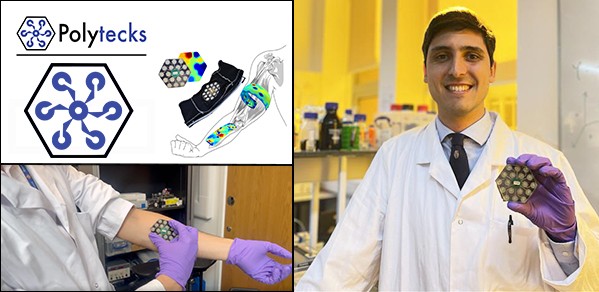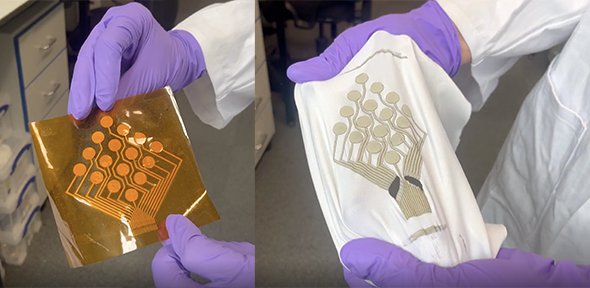
Ruben Ruiz-Mateos Serrano has taken his PhD research to the next level by launching Polytecks – a spin-out dedicated to faster, earlier and more accurate diagnostics for heart defects.
With Polytecks technology, we can record not only electrical heart signals but achieve higher spatial resolution than a conventional electrocardiogram (ECG).
Founder Ruben Ruiz-Mateos Serrano
Spun out of the Department of Engineering in 2025, Polytecks uses wearable electronic textile-based (e-textile) high-density electrode arrays to capture high-resolution bioelectrical signals from the body’s surface. These electrical heart signals, captured in real time, are then transmitted wirelessly to a computer, where they are processed into detailed spatiotemporal maps using AI.
The process enables the early and accurate detection of a wide range of electrophysiological phenomena – initially cardiac abnormalities – with potential applications in neurology, neuroprosthetics, gut health, foetal health, and beyond.
“We can record not only electrical heart signals but achieve higher spatial resolution than a conventional electrocardiogram (ECG),” said Ruben, the founder of Polytecks, and an MRes+PhD student at the Centre for Doctoral Training in Connected Electronic and Photonic Systems (CEPS). “This is thanks to our flexible, textile-based electrode array, which is coated with advanced conducting polymers.”
He added: “This means that Polytecks technology offers a higher electrode density compared to commercial solutions, while maintaining or improving signal quality. It can aid diagnosis of both electrical and anatomical heart problems such as valvular heart disease.”
Early testing of the prototype in dogs has focused on capturing cardiac signals, refining signal processing and demonstrating usability in a real-world setting. The aim is to produce a diagnosis within a few minutes at the point of service i.e. at a veterinary practice rather than at a veterinary hospital. Mitral valve disease, for example, is the most common heart condition in adult dogs. Early detection is crucial, as timely medication can extend their lives.
This research has been carried out in collaboration with The Queen’s Veterinary School Hospital in Cambridge, and builds upon Ruben’s PhD research under the supervision of Professor George Malliaras, who leads the Bioelectronics Laboratory at the Department of Engineering.
Ruben added: “Our final design is a relatively small hexagonal device, inserted into a strap that is then attached to a patient using hook-and-loop fasteners. We found that placing the electrodes in a radially symmetrical shape is well suited for picking up signals propagated around the heart.
“By combining high-density body surface mapping with responsible, transparent AI, we aim to improve the screening, staging and monitoring of diseases, initially in cardiology and veterinary applications, then expanding to neurology, neuroprosthetics, gut health, foetal health, and any field where non-invasive electrophysiological mapping can provide actionable insights.”

Coming up with the final prototype design was an iterative process, starting with polymeric substrates like polyimide (left) and then moving onto textiles (right) that are more conformable and comfortable. Credit: Undine-Sophie Deumer.
Learnings from Cambridge
Ruben, who will complete his PhD in October 2025, will continue in the Department as a postdoc. He has been working closely with Cambridge Enterprise on the patenting process for Polytecks technology, and recently took part in the impulse programme at Cambridge – a programme designed to help equip entrepreneurs like Ruben with the skill set needed to bring his innovation from lab to market.
“Running Polytecks requires skills beyond research, including leadership, resilience and practical business execution,” he said. “My Cambridge experience has given me the technical foundation, a strong work ethic, and the ability to navigate interdisciplinary challenges, all of which are essential for leading a spin-out.”
Reflecting on his time spent in the Bioelectronics Laboratory, Ruben added: “The best part has been collaborating on highly interdisciplinary projects. I have learned about materials science, manufacturing, clinical applications, veterinary medicine, biosensors, implantable devices and cell work, all of which has broadened my understanding of science as a tool to impact real-world health outcomes.
“Coming from a pure electrical engineering background focused on integrated circuit design, this exposure has been transformative. Professor Malliaras is a fantastic mentor and advisor; he is always available for discussion, despite leading a large lab, and his guidance, network and friendly approach have been invaluable.”
The next steps
Ruben has been selected to join a new incubator programme from King’s Entrepreneurship Lab (King’s E-Lab), delivered in partnership with Founders at the University of Cambridge.
SPARK 1.0 is a fast-paced, four-week residential incubator that began in late August 2025, designed to help early-stage ventures grow from research-backed ideas into investable companies.
Ruben’s goal is for Polytecks to become a global leader in textile-based wearable electrode arrays, enabling a new generation of diagnostic and monitoring tools across multiple healthcare domains.

